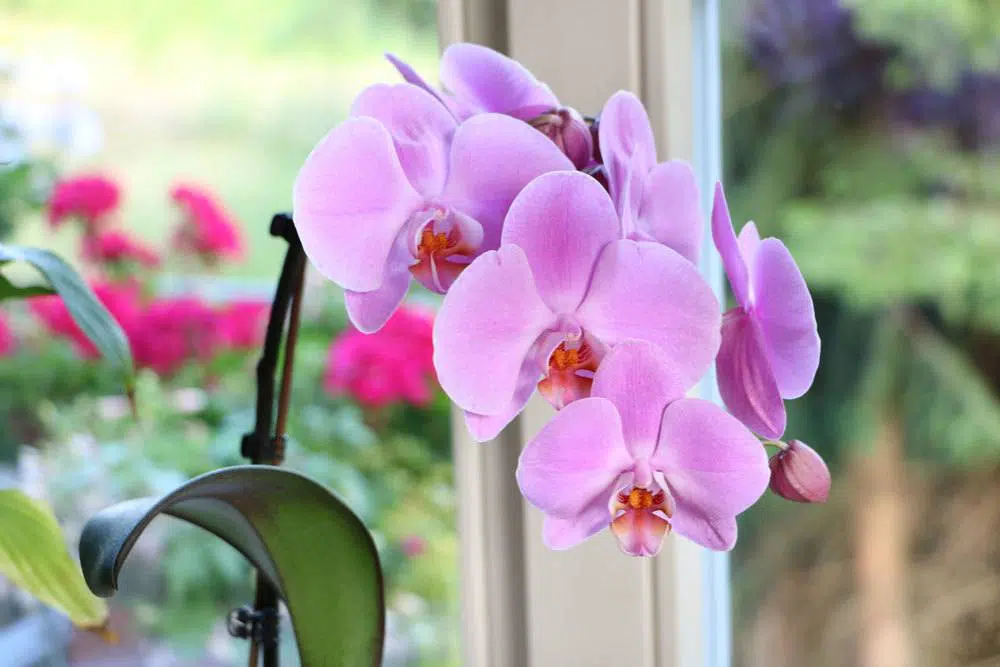Last updated on October 23rd, 2023 at 08:30 pm
Among plant lovers, there are myths that are impossible to eradicate. One of these myths is the claim that plants have no place in the bedroom. Or that orchids in the bedroom are harmful to health. However, it is at least as common to hear the claim that an orchid in the bedroom is not harmful, but rather healthy. High time, therefore, to deal with this dubious orchid myth. By the way, there is no scientific evidence for either claim.
Plants in bedrooms
It is a mystery why plants should not be cultivated in a bedroom or why they should be harmful there. In this context, there is often talk of some dangerous substances that are supposedly released by the plants and then inhaled by us while we sleep. If there were actually houseplants that emitted hazardous substances, they would be at least as dangerous in the living room. They would have nothing to look for in the dwelling in principle. Fortunately, such plants do not exist.
Sure, some of them secrete poisonous juices or produce toxins in their stems and leaves. If one comes into contact with them or even eats them, this can of course lead to considerable problems for humans and animals. But this also applies to the whole house and not only to the bedroom. Scientific studies have now established that plants in the bedroom have a positive effect on the indoor climate, because they can clean the air and provide higher humidity. But this means that they would actually be healthy.

Note: Plants that produce pollen can be problematic for pollen allergy sufferers. They easily lead to significant sleep disturbances and even an asthma attack in this group of people due to the constant irritation during the pollen season in bedrooms.
Orchids in the bedroom
The orchid is one of those plants that can contribute significantly to improving the indoor climate in a bedroom. Specifically, it provides higher humidity. However, not every type of orchid is suitable for bedrooms. In these, after all, it is usually relatively cool. This coolness is not at all suitable for a type of plant that is at home in tropical and subtropical regions. However, there are a few species that can cope very well with cooler temperatures. These include:
- Cymbidium (cocklebur)
- Cypripedium (Lady’s Slipper)
- Oncidium (callus orchid)
- Phalaenopsis (moth orchid).
The latter is a species that is not only extremely hardy, but also has no problems with rather low temperatures or temperature fluctuations. However, like all orchid species, it requires a relatively large amount of light. If you want to place an orchid in a cool bedroom, you should do so close to the window or directly on the window sill, if possible. By the way, all orchids are said to have a calming and mood-lifting effect through their flowers. Just before falling asleep, this can possibly contribute to a better sleep. They were then also healthy in this respect and not harmful.
Tip: An orchid should always be placed in bedrooms so that it is almost impossible to knock it over at night in the dark. This is because it could cause significant damage to the plant.
Pollen problem
Perhaps the myth that an orchid in the bedroom is harmful to health stems from the fact that the plant produces pollen. As already mentioned, it can thus very quickly become a torment for people who are allergic to pollen or pollen. The associated irritation of the nasal mucous membranes and respiratory tract are naturally particularly unpleasant at night and are perceived as extremely disturbing. For these people, in fact, orchids in the bedroom are completely unsuitable. They should resort to other plants. Recommended are, for example:
- Yucca palm
- Bow hemp
- Monocot
- Calla
- other non-flowering plants
It is also important to remember that orchids do not produce pollen all year round. It may be possible to move a plant to another room during the critical period.
Carbon dioxide
Yes, plants give off carbon dioxide – including the orchid. However, the amount is so small that there is absolutely no need to worry about suffocating in your sleep. In any case, winning the lottery is far more likely than dying of suffocation from carbon dioxide released by plants. Except for those allergic to pollen, an orchid in the bedroom is absolutely harmless.


